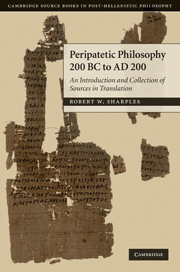Book contents
- Frontmatter
- Contents
- Preface
- Abbreviations
- Introduction
- Individuals
- Chapter 1 People
- Chapter 2 The rediscovery of Aristotle’s works?
- Chapter 3 A Hellenistic account of Aristotle’s philosophy
- Chapter 4 Philosophy and rhetoric
- Chapter 5 The starting-point and parts of philosophy
- Chapter 6 Commentaries
- Logic and ontology
- Ethics
- Physics
- Bibliography
- Index of sources
- Index of passages cited
- Index of personal names (ancient)
- General index
Chapter 3 - A Hellenistic account of Aristotle’s philosophy
Published online by Cambridge University Press: 05 June 2012
- Frontmatter
- Contents
- Preface
- Abbreviations
- Introduction
- Individuals
- Chapter 1 People
- Chapter 2 The rediscovery of Aristotle’s works?
- Chapter 3 A Hellenistic account of Aristotle’s philosophy
- Chapter 4 Philosophy and rhetoric
- Chapter 5 The starting-point and parts of philosophy
- Chapter 6 Commentaries
- Logic and ontology
- Ethics
- Physics
- Bibliography
- Index of sources
- Index of passages cited
- Index of personal names (ancient)
- General index
Summary
Diogenes Laertius, Lives and Opinions of Eminent Philosophers 5.28–34
(1) This is how many books [Aristotle] wrote. In them his views are these: philosophy is twofold, practical and theoretical. To the practical belong the ethical [part] and the political, in which both what concerns the city and what concerns the household are outlined. To the theoretical, physics and logic, of which logic is developed not independently, but as an instrument [organon]. He clearly proposed that it has two goals, what is persuasive and what is true. (2) He used two capacities for each of these, dialectic and rhetoric for what is persuasive, analytic and philosophy for what is true; he omits nothing which leads to discovery, to judgement or to utility. (3) With a view to discovery he handed down [to us, in] the Topics and the Methodics, a multiplicity of premisses, from which one may have an abundance of persuasive arguments for [solving] problems. For judgement [he handed down] the Prior and Posterior Analytics. By the Prior the premisses are judged, by the Posterior their combination is examined. For utility there are the [works] on contests and those concerned with questioning and sophistical refutations and syllogisms and things similar to these. (4) As criterion of truth, in the case of things that actually appear he declared it to be sense perception, but in the case of ethics and things concerning the city, the household and the laws, intellect.
(5) He set forth one [ethical] end, the employment of virtue in a complete life. (6) He said that happiness was a completion made up of three [types of] goods: those concerning the soul, which indeed he calls first in power; secondly those concerning the body, health and strength and beauty and the like; thirdly external [goods], wealth and good family and reputation and things like these. (7) Virtue is not sufficient for happiness; for there is also need of bodily and external goods, since the wise man will be unhappy in pains, poverty, and the like. But wickedness is sufficient for unhappiness, even if it possesses external and bodily goods to the greatest extent possible. (8) He said that the virtues do not imply one another; for it is possible for someone to be wise, and similarly just, but also profligate and lacking in self-control. (9) He said that the wise man is not free from passions [apathēs] but moderate in passions [metriopathēs]. (10) He defined friendship as an equality in reciprocal goodwill; of it one [type] is for relations, another erotic and another for strangers. Love is not only for intercourse but also for philosophy. The wise man will fall in love and engage in politics, marry and be the courtier of a king. There are three ways of life, the theoretical, the practical and that devoted to pleasure, and of these he preferred the theoretical. Ordinary studies are useful for the attainment of virtue.
- Type
- Chapter
- Information
- Peripatetic Philosophy, 200 BC to AD 200An Introduction and Collection of Sources in Translation, pp. 31 - 34Publisher: Cambridge University PressPrint publication year: 2010



